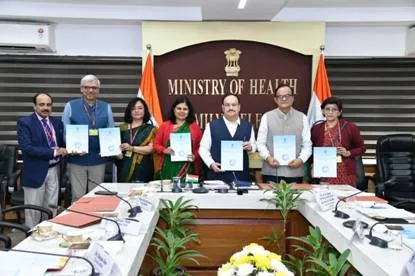

Delhi, Nov 18: Union Minister of Health and Family Welfare, Jagat Prakash Nadda, launched the second version of the National Action Plan on Antimicrobial Resistance (2025–29), here today.
Speaking on the occasion, Nadda emphasized that antimicrobial resistance (AMR) is a major public health concern that can only be addressed through collective action. He noted that the journey began in 2010 with initial discussions, followed by the launch of the first NAP-AMR in 2017.
Highlighting the gravity of the challenge, he stated that AMR poses significant risks, particularly in surgical procedures, cancer treatment, and other critical healthcare interventions. He added that the overuse and misuse of antibiotics has unfortunately become common practice, underscoring the urgency of corrective measures. Several important initiatives have been undertaken by various line ministries in this regard.
Nadda also pointed out that NAP-AMR 2.0 addresses the gaps identified in the first NAP-AMR by increasing the ownership of AMR-related efforts, strengthening inter-sectoral coordination and ensuring stronger engagement with the private sector. Asserting on the key strategies of AMR containment which are to be implemented under NAP AMR 2.0, he stated the importance of increasing awareness, education and training. He also highlighted the requirement of enhancing laboratory capacity and infection control in healthcare facilities. Shri Nadda stressed on the importance of regular stakeholder meetings to resolve challenges promptly.
Dr A K Sood stated that the NAP-AMR 2.0 is timely initiative for generating a more coherent action plan which is aptly being released on the first day of the WHO’s World AMR Awareness Week (18-24 Nov). Noting that India is one of the pioneers in driving this initiative globally, he stated that AMR is a like a pandemic affecting many countries especially the developing countries in Asia and Africa.
Dr Sood highlighted some of the steps taken by India in countering the menace of AMR. He pointed out that Kerala and Gujarat are the first states to ban over-the-counter sales of antibiotics. Some antimicrobials and pesticides have also been banned for use in crops. “The India AMR Innovation Hub was established involving both national and international stakeholders to build a novel technology platform. It has helped in mobilizing resources, bringing out innovation and enhancing collaboration between multiple stakeholders,” he stated.
Antimicrobial resistance (AMR) has been identified as a global health threat with serious health, political and economic implications. AMR leads to delays in treatment thus increasing the risk of spreading resistant microorganisms and health-care costs and the economic burden to families and societies. AMR threatens the safety and effectiveness of procedures such as surgical interventions, cancer treatment, and organ transplants thereby having the potential to reverse the advancements made not just in modern medicine but also the growth and economy at the global and national levels.
AMR is recognized as a National Priority and the Union Health Ministry has taken several steps for AMR Containment. The National Task Force on AMR Containment was constituted in 2010 leading to development of the National policy on AMR containment in early 2011. In April 2017 the National Action Plan on Antimicrobial Resistance (NAP-AMR) developed in alignment with Global Action Plan (GAP) was launched which was to be implemented over next 5 years (2017-2021).
While AMR is a multisectoral issue and requires a One Health Approach for its containment, only when each sector, i.e., human, animal, agriculture and environment sector are committed for action to contain AMR, can the One Health approach be successful. The development of NAP-AMR 2.0 started in 2022 through series of stakeholder consultations held for the human health sector, research sector, professional associations and civil society organizations, environment and animal husbandry sectors. This was followed by high level meetings conducted at NITI Aayog with participants from more than 20 concerned ministries and departments. Each stakeholder ministry/department developed their respective action plan with defined goals and timelines.
The updated NAP-AMR includes specific action plans of each key stakeholder ministry/department with timelines and budget to enable effective monitoring of progress in implementation of the national action plan. The updated NAP AMR also includes well defined mechanisms for coordination and collaboration within and across the sectors.
After its launch each stakeholder ministry/ department is expected to develop their implementation roadmap ensuring engagement of private sector, technical institutions, professional groups, industry, cooperatives, NGOs, International partners and other relevant organisations. During the launch event on the occasion of the first World AMR Awareness Week, all stakeholders have once again reaffirmed their determination to implement the National action plan 2.0 for containing AMR.
Senior officials of the Union Health Ministry and other stakeholder ministries including Ministry of Fisheries, Ministry of Animal Husbandry and Dairying (MoFAHD), Ministry of Agriculture & Farmers Welfare (MoAFW), Ministry of Environment, Forests & Climate Change (MoEFCC), Ministry of Science & Technology (MoST), Ministry of Chemical.
He was joined by Dr A K Sood, Principal Scientific Advisor; Punya Salila Srivastava, Union Health Secretary; Dr Rajiv Bahl, Secretary, Dept. of Health Research and Dr Sunita Sharma, Director General of Health Services (DGHS).